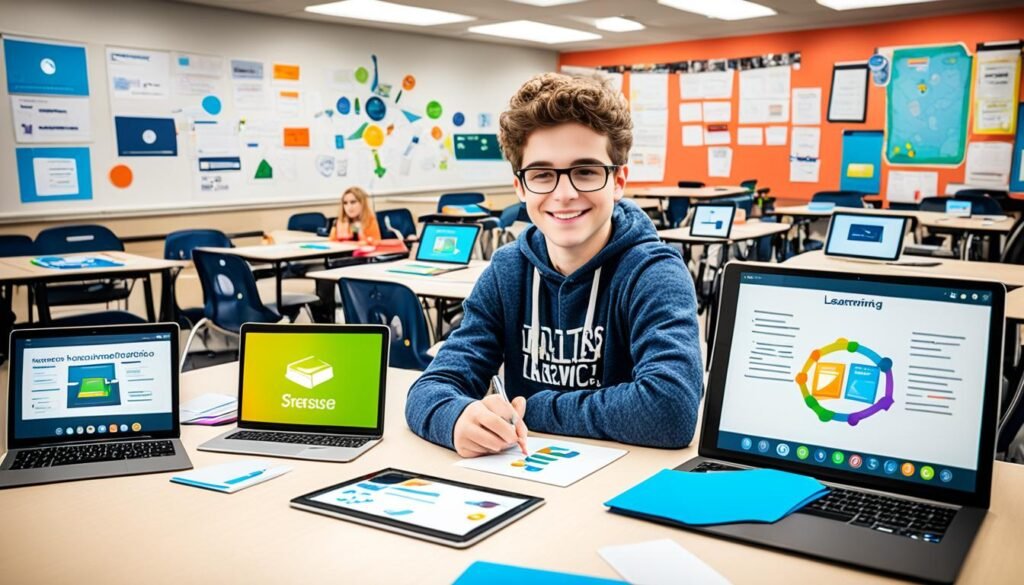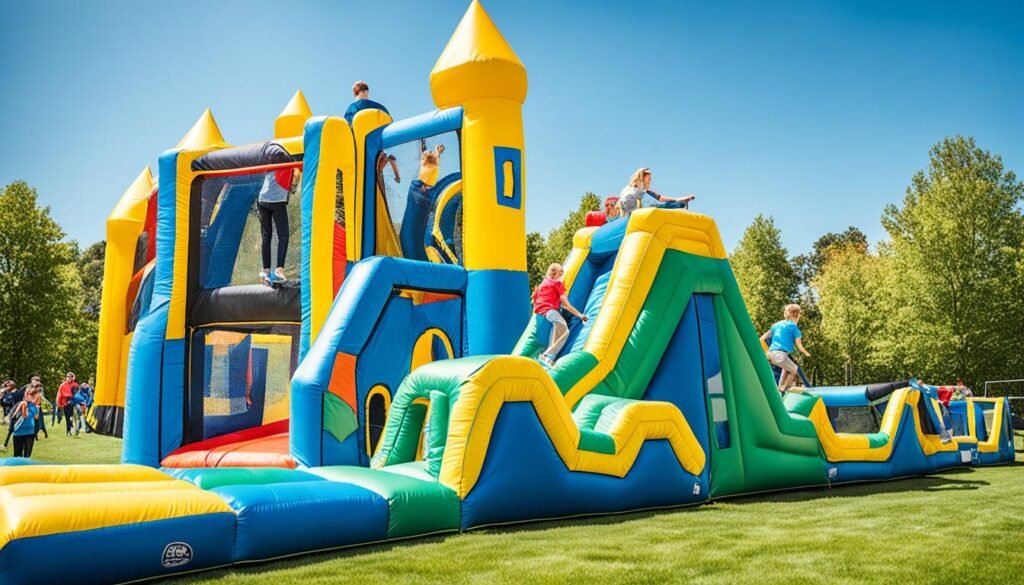Have you ever considered whether the conventional approach to education truly serves every student’s unique needs? In a world where diversity in learning styles is increasingly acknowledged, tailored learning experiences and personalised education are becoming essential for fostering academic success. By adapting teaching methods and integrating adaptive learning technologies, educators can create environments that nurture each student’s potential. This article delves into the myriad benefits of personalised education and its growing significance in today’s learning landscape.
Key Takeaways
- Each student learns differently, requiring unique educational approaches.
- Personalised education fosters enhanced engagement and improves academic performance.
- Integrating technology plays a crucial role in tailoring learning experiences.
- Understanding individual learning styles is fundamental for effective teaching.
- Parental involvement significantly impacts the effectiveness of personalised education.
- Future trends in education highlight the importance of adaptive learning technologies.
The Importance of Tailored Learning Experiences
Understanding the significance of personalised education offers crucial insights for both educators and learners. Tailored learning experiences recognise that each student has unique learning preferences and capabilities. Research demonstrates that such personalised approaches can enhance student motivation and engagement, which are essential for better academic performance.
The benefit of tailored learning extends beyond academic success; it promotes inclusivity, allowing every learner to feel valued and understood. When educational strategies cater to individual needs, students are more likely to thrive and develop a passion for lifelong learning. This personalised approach not only addresses differences in learning styles but also fosters a supportive environment conducive to growth.
Recent studies indicate that implementing personalised education strategies can lead to higher satisfaction rates among students, as they feel more connected to their learning journey. As you explore the importance of tailored learning experiences, consider how these practices can genuinely transform the educational landscape for the better.
Understanding Individual Learning Styles
Recognising the different learning styles is essential for creating effective tailored learning experiences. You can identify three primary categories: visual learners, auditory learners, and kinaesthetic learners. Each group has distinct strengths that should be accommodated in educational settings to enhance learning and engagement.
Visual Learners
Visual learners thrive on images, diagrams, and charts. Incorporating visual aids into lessons can significantly aid these learners in processing information. For instance, using infographics can help illustrate complex concepts in a more digestible format. Statistics indicate that engaging visual learners with appropriate tools can improve their retention of information1.
Auditory Learners
In contrast, auditory learners prefer to engage through listening activities such as lectures and discussions. Implementing storytelling and group discussions can cater effectively to the needs of these learners. Utilising podcasts and audio recordings allows these students to absorb information through sound, reinforcing their learning experience. Research shows that interactive auditory methods enhance comprehension and involvement2.
Kinaesthetic Learners
Kinaesthetic learners excel when they can touch and manipulate materials in their learning process. Hands-on experiences, experiments, and physical activities are crucial for them to grasp new concepts effectively. By allowing these students to engage in role-playing or practical exercises, educators can stimulate their interest and reinforce learning. This multi-sensory approach fosters an inclusive educational environment that benefits all learning styles.
Benefits of Personalised Education
Personalised education offers substantial benefits, significantly impacting both student engagement and academic improvement. By tailoring learning experiences to meet the unique needs of every learner, it creates an environment where individuals feel more invested in their education.
Enhanced Engagement
One of the primary advantages of personalised education is enhanced engagement. When students have their educational journeys customised, they are more likely to participate actively in lessons and discussions. This bolstered engagement translates into higher retention rates, making the learning experience much more effective.
Improved Academic Performance
Furthermore, personalised education leads to improved academic performance. Strategies that cater to various learning styles ensure that students grasp concepts more profoundly. This method not only fosters a better understanding of the content but also encourages a positive attitude towards learning, contributing to overall academic success.
Integrating Technology into Tailored Learning Experiences
The integration of technology in education significantly enhances tailored learning experiences. By employing adaptive learning technology, educators can personalise the learning journey for each student. This technology assesses student progress, allowing for customised resources that focus on individual needs. Digital learning tools facilitate real-time feedback, enabling students to understand their progress and areas for improvement.
Interactive platforms, such as quizzes and simulations, provide engaging methods for students to learn and retain information effectively. These tools not only enrich the educational experience but also make learning more accessible across various student demographics. By incorporating these advancements, you foster a responsive environment that adjusts to each learner’s unique style, maximising their potential. Integrating such innovative technology can lead to more successful learning outcomes and a deeper understanding of the curriculum.

Ultimately, leveraging technology in education, particularly through adaptive learning technology and various digital learning tools, can create an enriching academic environment. This approach not only aids in addressing diverse learning needs but also enhances overall student engagement and satisfaction with their educational experience3.
Case Studies: Success Stories of Tailored Learning
This section highlights various real-world applications showcasing the effectiveness of tailored learning. Through detailed case studies in personalised education, success stories from The Continents States University illustrate how personalised approaches have empowered students to reach their academic aspirations.
Example from The Continents States University
The Continents States University has implemented innovative teaching methods to meet the diverse learning needs of its students. As a result, the institution has witnessed significant improvements in student engagement and academic results. Personalised education strategies, including individual learning plans and adaptive technologies, have proven crucial in guiding students towards their goals. These case studies in personalised education exemplify successful interventions that cater to different learning styles and preferences, demonstrating a committed effort to student success4.
Community Initiatives Supporting Personalised Education
In addition to university efforts, community initiatives play a vital role in promoting personalised education. Various programmes have been established to encourage collaboration among schools, families, and local organisations, contributing to a supportive learning environment. These initiatives highlight successful stories where community engagement has led to improved educational outcomes, fostering inclusivity and access for all learners. Such community efforts align seamlessly with the goals of tailored learning, enhancing the educational landscape for students5.
Challenges in Implementing Tailored Learning Experiences
Implementing tailored learning experiences is fraught with challenges in personalised education that can significantly hinder progress. One of the prominent barriers to tailored learning is resource constraints. Schools often struggle to acquire the necessary tools and technologies to facilitate individualised education plans effectively.
Varying levels of teacher training pose another obstacle. Not all educators receive adequate professional development to implement these practices, leading to inconsistencies in student experiences. Resistance to change is another critical factor; established traditions within educational systems can create hurdles against the adoption of innovative approaches.
Addressing these challenges requires a comprehensive strategy. Investing in professional development for educators is crucial, ensuring they have the skills to manage personalised education effectively. Increased funding and resources are necessary to establish an inclusive learning environment where all students can thrive.

Ultimately, overcoming the barriers to tailored learning experiences can lead to more effective educational outcomes, ensuring that every student receives the support they need to succeed467.
Strategies for Educators to Create Personalised Learning Paths
Creating personalised learning paths requires thoughtful approaches that cater to the unique needs of each student. Understanding the significance of effective student assessment is fundamental in this process. By carefully evaluating individual needs, educators can better implement strategies for personalised education that foster student growth.
Assessing Student Needs
To begin creating personalised learning paths, educators must engage in a thorough assessment of student needs. This can involve:
- Conducting surveys to gauge student interests and learning preferences.
- Observing classroom behaviour to identify strengths and areas for improvement.
- Holding one-on-one conversations to gain deeper insights into individual challenges.
Utilising such methods allows educators to make informed decisions and tailor their approaches, ensuring that each student’s unique learning requirements are met. This targeted student assessment is vital for guiding the development of personalised education strategies.
Utilising Diverse Teaching Methods
Incorporating diverse teaching methods is essential in catering to various learning styles. This can take the form of:
- Hands-on activities that engage kinaesthetic learners.
- Visual aids such as diagrams and videos for visual learners.
- Group discussions and lectures aimed at auditory learners.
By broadening the scope of instructional strategies, educators can provide a more inclusive environment where all students feel engaged. Implementing these diverse teaching methods not only fosters student understanding but also enhances motivation and participation in the learning process.
Role of Parental Involvement in Tailored Learning
Parental involvement in education is critical for fostering student success within a supportive education environment. When parents actively engage in their child’s learning process, they contribute significantly to the development of tailored learning experiences that resonate with individual needs.
To enhance the relationship between parents and educators, consider the following strategies:
- Encourage open communication between teachers and parents to discuss student progress and challenges.
- Organise workshops that educate parents on how to support learning at home effectively.
- Involve parents in setting educational goals alongside their children, which can motivate students and create a sense of ownership over their education.
- Utilise technology to keep parents informed about classroom activities and their child’s achievements.
Establishing a strong partnership not only benefits students in honing their skills but also solidifies a community that values education. Such collaboration helps create a supportive education environment that promotes learning and growth, ultimately leading to enhanced student success and wellbeing. This synergy is essential in ensuring that education systems adapt to the diverse learning needs of every student.

Future Trends in Tailored Learning Experiences
As we contemplate the future of education, emerging trends in tailored learning are set to redefine educational landscapes. The integration of adaptive technologies will play a pivotal role in personalising educational experiences, allowing students to learn at their own pace and effectively engage with their course material.
Adaptive Learning Technologies
Adaptive learning technologies are essential in creating a flexible educational framework. These tools use data analytics to assess student progress, adjusting the learning path to meet individual needs. By understanding your unique learning style, adaptive technologies can provide custom resources and assessments, which enhances the overall learning experience.
Collaborative Learning Environments
Collaborative learning environments further enrich the educational framework by encouraging peer interactions. Such settings promote group work and shared problem-solving, allowing students to develop collaborative skills alongside content mastery. As these environments gain traction, the focus will shift towards creating inclusive spaces where learners can thrive together8, whilst benefiting from shared insights and diverse perspectives.
Tailored Learning Experiences and Inclusivity
Inclusivity in education is a fundamental principle that underpins the design of tailored learning experiences. It is essential to ensure that personalised learning for all is not merely an aspirational goal but a tangible reality. Every student, irrespective of their background or learning ability, should have equitable access to educational opportunities that cater to their unique needs.
Employing universal design principles can significantly enhance the learning environment. This approach facilitates the creation of resources and experiences that accommodate diverse learning styles, thereby fostering inclusivity. Tailored learning experiences must incorporate various methods and strategies to engage each student effectively, promoting an atmosphere where personalised education thrives.
When schools prioritise inclusivity, they empower students to achieve their fullest potential. Educators play a crucial role in this process by developing personalised learning paths that consider individual strengths and challenges. Embracing inclusivity in education can drive positive change, creating classrooms where every student flourishes.

Developing policies that support accessibility and providing professional development for educators are vital steps in this journey. Continuous reflection on instructional practices and student feedback can further enhance the commitment to personalised learning for all. Ultimately, fostering an inclusive educational landscape is essential for nurtuting a future generation of learners who are equipped and inspired to succeed.
How to Evaluate the Effectiveness of Tailored Learning
Evaluating the effectiveness of tailored learning experiences is essential for ongoing enhancement of educational practices. You should consider implementing various assessment methods to determine the impact of personalised education. These methods encompass formative assessments, which allow you to monitor progress regularly, and gathering student feedback to gain insights into their learning experiences.
Another critical aspect includes the assessment of tailored learning outcomes through academic performance metrics. Establishing clear evaluation criteria is necessary as it can help you measure the overall effectiveness of the personalised approach on student achievements. By adopting these evaluation techniques, you contribute to a cycle of continuous improvement in educational strategies, ultimately leading to better student outcomes.
Your focus on evaluating personalised education not only promotes accountability but also ensures that learning experiences remain responsive to the diverse needs of your students. Implementing such assessment methods will facilitate the effective monitoring of progress and refinement of tailored learning strategies.
By prioritising these assessments, you pave the way for sustained improvements and a deeper understanding of how tailored learning impacts student success and engagement.
Conclusion
The exploration of tailored learning experiences reveals their vital significance in contemporary education. A summary of personalised education emphasises that recognising diverse learning styles and employing technology not only heightens engagement but also leads to improved academic performance. As you reflect on these insights, the future of tailored learning experiences appears promising, driven by a combination of adaptive technologies and innovative teaching strategies.
By embracing personalised approaches, educators and parents can foster an environment that supports all students in reaching their fullest potential. Encouraging a commitment to ongoing professional development and resource exploration will equip you and your colleagues to enhance educational strategies effectively. Remember, optimising education through tailored experiences equips students with the skills they need to thrive in an ever-changing world.
In conclusion, it is essential to acknowledge the outcomes of personalised education as not only beneficial for individual achievement but also foundational for a more inclusive and dynamic learning environment. Through ongoing collaboration and investment in training, the educational landscape can evolve, providing all learners with opportunities to succeed, thus symbolising a commitment to future generations111213.
Source Links
- Alvernia Lifelong Learning – https://www.alvernia.edu/community-engagement/alvernia-lifelong-learning
- AI in education: Boosting teacher efficiency & student engagement – https://www.thehansindia.com/hans/young-hans/ai-in-education-boosting-teacher-efficiency-student-engagement-896514
- Building Trust: The Foundations of Reliability in Healthcare – https://link.springer.com/chapter/10.1007/978-3-031-65434-3_3
- Comparative analysis of vision transformers and convolutional neural networks in osteoporosis detection from X-ray images – Scientific Reports – https://www.nature.com/articles/s41598-024-69119-7
- How Digital Platforms are Enhancing the Efficiency of Microfinance and Community Lending – https://techbullion.com/how-digital-platforms-are-enhancing-the-efficiency-of-microfinance-and-community-lending/
- YOSMR: A Ship Detection Method for Marine Radar Based on Customized Lightweight Convolutional Networks – https://www.mdpi.com/2077-1312/12/8/1316
- ArcGIS Solutions introduces Essential Data Models to Utility Network Foundation solutions – https://www.esri.com/arcgis-blog/products/arcgis-solutions/data-management/arcgis-solutions-introduces-essential-data-models-to-utility-network-foundation-solutions/
- AHDB looks to levy payers to submit arable research ideas – Farmers Weekly – https://www.fwi.co.uk/arable/crop-management/ahdb-looks-to-levy-payers-to-submit-arable-research-ideas?utm_source=homelatestnews
- CrowdStrike outage will cost Fortune 500 companies $5.4 billion in damages – https://fortune.com/2024/08/03/crowdstrike-outage-fortune-500-companies-5-4-billion-damages-uninsured-losses/
- Opinion: Time to press reset on food, nature and people – Farmers Weekly – https://www.fwi.co.uk/news/opinion-its-time-to-reset-the-relationship-between-food-nature-and-people
- Wellness: A Comprehensive Guide 1 Day Workshop in Murrieta, CA – https://www.eventbrite.com/e/wellness-a-comprehensive-guide-1-day-workshop-in-murrieta-ca-tickets-971832917417
- The Evolution of Online Learning Platforms – https://www.bulbapp.io/p/bc290a29-5b86-43a4-8ec1-37df06048690/the-evolution-of-online-learning-platforms
- Designer, Footwear – New York, New York, United States job with Tory Burch | 269450 – https://www.businessoffashion.com/careers/job/269450/designer-footwear/


